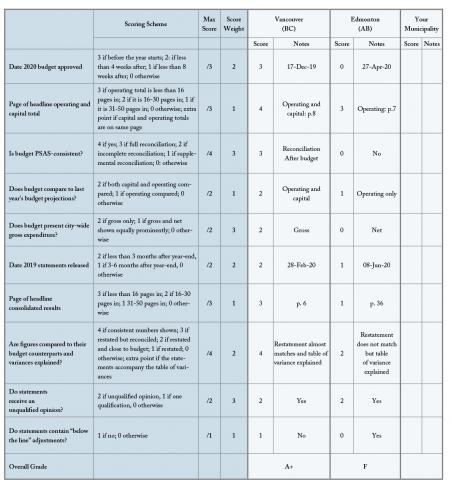From: William Robson and Miles Wu
To: Municipal Councillors, Ratepayers and Voters
Date: January 21, 2021
Re: Grading Your Municipality’s Financial Transparency
After each release of the C.D. Howe Institute’s annual report card on the financial transparency of Canada’s major cities, we get requests from councillors, ratepayers and residents in other places for additions to the report. We wish we could cover more cities! But as a charity, the Institute has limited resources, which limits our scope. Our report card currently covers Canada’s 31 most populous municipalities: 25 single-tier, plus the six largest regions in Ontario. Since the problems it highlights undermine decision-making and accountability across the country, this Intelligence Memo presents a do-it-yourself kit for grading municipal budgets and financial statements.
Our goal is that non-experts should be able to quickly and confidently get numbers for revenue, spending and the bottom line that allow basic comparisons – such as what a city plans to spend this year versus last year, and how much it spent compared to plans after the year is over – and act on any problems they find. To do that, they need documents that:
-
Show the key numbers up front, clearly identified;
-
Give the full picture of the municipality’s activities;
-
Consistently apply public sector accounting standards, so numbers in one place match counterparts elsewhere; and
-
Be timely, with budgets voted before the year begins, and financial statements published shortly after it ends.
The C.D. Howe Institute’s report card grades municipal budgets and financial statements using a template summarized in the table. Each row describes one criterion, the range of possible scores on it, and the weight for that score, expressed as a percentage of the maximum possible for it, in the overall grade. We illustrate with the scores for Vancouver, which earned an A+ in our 2020 report card, and for Edmonton, which earned an F. The final column is blank, ready for the scores of your municipality.
If you care about the financial transparency of a municipality that is not in our report card, please access its latest budget and financial statements, and fill in the template. You should not need an accounting degree or a platoon of researchers for this task. If your municipality’s documents are so poorly organized, and its figures so inconsistent, that a person who can read and compare numbers cannot do it in 20 minutes, it deserves a low grade. If its numbers are easy to find, identify and compare, it deserves a high grade.
Please share your results with other interested councillors, ratepayers and voters, and with us at the C.D. Howe Institute. Transparent budgets and financial statements do not guarantee good government, but they are a key foundation. Canada’s municipalities provide critical services, and cost lots of money. Canadians deserve fiscal accountability to match.
William B.P. Robson is CEO at the C.D. Howe Institute, where Miles Wu is Research Assistant.
To send a comment or leave feedback, email us at blog@cdhowe.org.
The views expressed here are those of the authors. The C.D. Howe Institute does not take corporate positions on policy matters.






